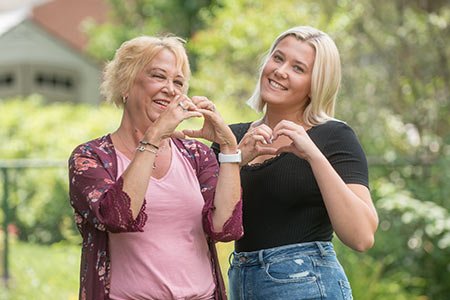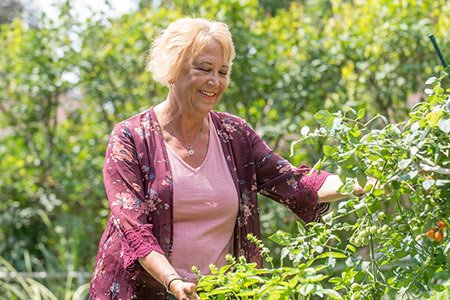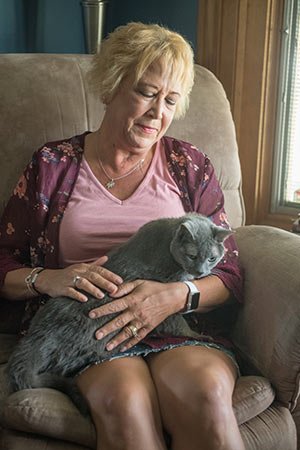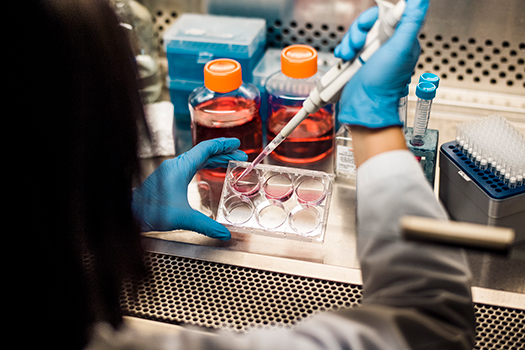Request Information on Clinical Trials
If you were diagnosed with lung cancer we may have a clinical trial for you.
Hard-working and confident, Susan Pinkowski presumed her wintertime cough would work itself out. Instead, it got worse. During the coronavirus lockdown in April, Susan, a finance director, was working at home when coughing prevented conversations. COVID-19 was ruled out. But a chest X-ray showed several tiny nodules on both lungs.
 When breathing became more difficult, she didn’t want to wait for the scheduled CT scan, and she took herself to Henry Ford Medical Center – Fairlane in Dearborn. From there, an ambulance transported her to the Henry Ford Hospital emergency room in Detroit.
When breathing became more difficult, she didn’t want to wait for the scheduled CT scan, and she took herself to Henry Ford Medical Center – Fairlane in Dearborn. From there, an ambulance transported her to the Henry Ford Hospital emergency room in Detroit.
“This was right in the midst of COVID, and most of the patients in the hospital at that time were COVID patients,” recalls Susan, 58. “I was a little bit panicked. Doctors suspected tuberculosis and put me in an isolation room, so it kept me safe from everybody else.”
Susan’s biopsy revealed that she had non-small cell lung cancer, stage 4. Then, medical oncologist Igor Rybkin, M.D., Ph.D., gave her an offer she didn’t refuse – the Krystal-1 clinical trial. The immunotherapy drug Keytruda would be combined with the clinical trial oral drug MRTX-849 to attack the cancer in her lungs.
 “Susan started to feel better symptomatically within one week of starting the study drug,” Dr. Rybkin says. “She had less shortness of breath. On the first scheduled CT scan, the tumor showed a response to the study drug with decreased size of the nodules.”
“Susan started to feel better symptomatically within one week of starting the study drug,” Dr. Rybkin says. “She had less shortness of breath. On the first scheduled CT scan, the tumor showed a response to the study drug with decreased size of the nodules.”
“I always encourage people to check clinical trials,” Susan says. “Although they are not for everyone, a clinical trial has helped me. The clinical trial drug initially made me a little nauseated. But the alternative would have been traditional chemotherapy. “The attentiveness and support you get from your medical staff in a clinical trial is phenomenal. They are trying to establish normal benchmarks, so by being a participant you help them, and they’re helping you. They’re always at your beck and call, ready to do whatever you need. I feel like a queen,” Susan laughs. “If I didn’t enroll in this clinical trial, I wouldn’t have all this cancer diminished in such a short period of time.”
 “Susan is a delightful patient and open minded about trials,” Dr. Rybkin says. “Her positive outlook has helped her through difficult times.” During her treatment, Susan focused on doing some of the things she loves, such as camping and taking candid photos. “I like capturing the moment,” Susan says. Using her creativity and organizational skills, Susan takes a leap further and captures the years by scrapbooking and preserving memories.
“Susan is a delightful patient and open minded about trials,” Dr. Rybkin says. “Her positive outlook has helped her through difficult times.” During her treatment, Susan focused on doing some of the things she loves, such as camping and taking candid photos. “I like capturing the moment,” Susan says. Using her creativity and organizational skills, Susan takes a leap further and captures the years by scrapbooking and preserving memories.
Susan admits the transition from feeling healthy to fighting cancer has been challenging. “I’m a workhorse, and I’ve always been the rock in the family,” says Susan, who has 20-year-old twin daughters and a 23-year-old son living at home.
“I used to be the person in control, helping everyone else, and now they’re helping me. It’s very humbling. They’re always there when I need them. My husband has been wonderful, and my parents and siblings are very supportive.”
And then there’s another “family” member available for comfort and companionship. Susan’s cat Nemo is on-call 24/7. In a house decorated with owls, Susan values wisdom and boosts her perception by looking all around herself for what she needs. She doesn’t have to look far for a role model of someone who keeps going strong in difficult times. “My father has been ill, off and on, for ten years, but he just never, ever gives up,” she says. “He’s a very positive person. I always tell him, ‘You taught me how to keep fighting, even when you don’t have any fight left.’ He is my mentor.”
Speaking with the underpinning of a finance director, Susan has solid advice for other patients. “Never give up hope,” she says. “Never stop pushing as far as you can – to get what you need and get through the challenge. Don’t give up, even if someone doesn’t want to listen to you.” Now Susan will continue her immunotherapy treatments, and her doctors will keep looking for evidence of decreased cancer. “My kids are young,” Susan says. “I’ve got their college graduations, weddings, grandkids eventually and travel when COVID’s done. There is so much I still want to do.”

If you were diagnosed with lung cancer we may have a clinical trial for you.
We use cookies to improve your website experience. By using this site, you agree to our Terms of Use. Read our Internet Privacy Statement to learn what information we collect and how we use it.